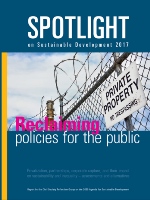Social Watch News
|
Source: . Published on Wed, 2017-07-12 00:00
TWN Info Service on Biodiversity and Traditional Knowledge (Jul17/01) Reclaiming policies for the public A global coalition of civil society organizations and trade unions have presented the report 'Spotlight on Sustainable Development 2017' on 10 July 2017. It was published on the opening day of the High Level Political Forum at the United Nations in New York. The report provides the most comprehensive independent assessment of the implementation of the 2030 Agenda and its Sustainable Development Goals (SDGs). |
|
Source: . Published on Tue, 2017-07-11 15:09
Nueva York (Notimex). Erradicar la pobreza extrema para el año 2030, una aspiración central de los Objetivos de Desarrollo Sostenible (ODS) de Naciones Unidas, es posible, pero sería necesario cambiar los actuales enfoques de política pública impulsados en el mundo, de acuerdo con un estudio. Elaborado por una coalición de organismos civiles y sindicatos, el documento señaló que la erradicación es posible con los recursos económicos actuales en el mundo, pero las políticas públicas que podrían lograr ese propósito han sido severamente debilitadas en las últimas décadas. |
|
Source: . Published on Tue, 2017-07-11 15:09
Erradicar la pobreza extrema para el año 2030, una aspiración central de los Objetivos de Desarrollo Sostenible (ODS) de Naciones Unidas, es posible, pero sería necesario cambiar los actuales enfoques de política pública impulsados en el mundo, de acuerdo con un estudio. Elaborado por una coalición de organismos civiles y sindicatos, el documento señaló que la erradicación es posible con los recursos económicos actuales en el mundo, pero las políticas públicas que podrían lograr ese propósito han sido severamente debilitadas en las últimas décadas. |
Published on Tue, 2017-07-11 14:43
Global Spotlight Report says that the Agenda 2030 proposal to eradicate poverty by 2030 is achievable but tax policies need to change. “The promise made by governments to eradicate poverty by 2030 is doable if countries cooperate to fight tax evasion and capital flights” argues an independent report submitted to the High Level Political Forum of the United Nations as an input to its debate today around the first of the Sustainable Development Goals (SDGs). |
Published on Tue, 2017-07-11 10:48
The “leave no one behind” slogan and the proposition to increase funding “from billions to trillions” made by the development banks and the International Monetary Fund are the two policy messages most commonly heard at the debate around the Sustainable Development Goals (SDGs) that started yesterday at the United Nations. “You cannot have both at the same time” commented Roberto Bissio, coordinator of Social Watch, summarizing the analysis of the first SDG by the global Spotlight report, the major comprehensive independent assessment of the SDGs launched during the HLPF. |
|
Source: . Published on Tue, 2017-07-11 00:00
Las privatizaciones del sector público han servido para empeorar las condiciones de vida pues exacerban las desigualdades, y ponen en peligro el cumplimiento de los derechos humanos. México. Erradicar la pobreza extrema para el año 2030, una aspiración central de los Objetivos de Desarrollo Sostenible (ODS) de las Naciones Unidas, es posible, pero sería necesario cambiar los actuales enfoques de política pública impulsados en el mundo, de acuerdo a un estudio. Elaborado por una coalición de organismos civiles y sindicatos, el documento señaló que la erradicación es posible con los recursos económicos actuales en el mundo, pero las políticas públicas que podrían lograr ese propóstico han sido severamente debilitadas en las últimas décadas. |
Published on Tue, 2017-07-11 00:00
This is not just about ODA but also about fighting tax evasion and recovering the assets stolen or illegally transferred to fiscal havens” said Roberto Bissio, coordinator of Social Watch, speaking on behalf of the Civil Society Financing for Development Group during an official session of the High Level Political Forum at the UN. Bissio said tax collaboration is essential and it should happen at the UN. Yet, there is a trend not to complement the Global Partnership but to substitute it with multiple PPPs that are non-transparent and not accountable. Recent Latin American experience additionally links PPPs with corruption on a massive scale. Mr. Bissio participated at the Thematic review: "Eradicating poverty and promoting prosperity in a changing world: Multi-stakeholder perspectives" that took place on July 11, 2017 during the Highl-level Political Forum in the United Nations, New York. |
|
Source: . Published on Tue, 2017-07-11 00:00
NUEVA YORK (Notimex).- Erradicar la pobreza extrema para el año 2030, una aspiración central de los Objetivos de Desarrollo Sostenible (ODS) de Naciones Unidas, es posible, pero sería necesario cambiar los actuales enfoques de política pública impulsados en el mundo, de acuerdo con un estudio. |
|
Source: . Published on Tue, 2017-07-11 00:00
The ITF has contributed to a major civil society report on sustainable development launched on the first day of the United Nations’ High-Level Political Forum. Spotlight on Sustainable Development 2017 highlights how privatisation, public-private partnerships and the growing influence of corporate bodies over governments and international institutions are threatening the achievement of the UN’s sustainable development goals (SDGs). |
|
Source: . Published on Mon, 2017-07-10 17:29
The Reflection Group on the 2030 Agenda for Sustainable Development (www.reflectiongroup. org), created in 2011 to offer independent analysis and suggestions to the international debate, decided in 2015 to regularly watch and assess the implementation of the new 2030 Agenda and the structural obstacles in its realization, and to present its findings in an annual “Spotlight Report”. The report is supported by a broad range of CSOs and trade unions, and based on the experiences and reports by national and regional groups and coalitions from all parts of the world. |
SUSCRIBE TO OUR NEWSLETTER










